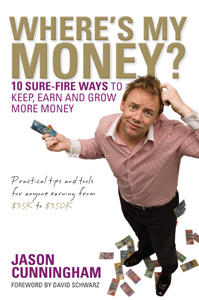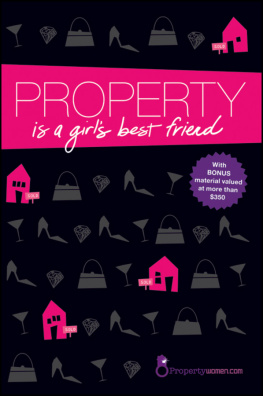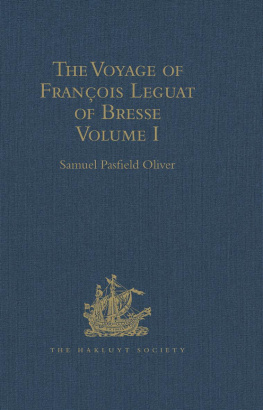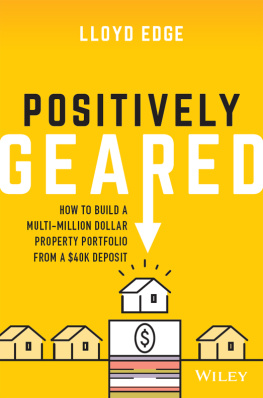Samuel Oliver - Advance To GO: Win Your Financial Freedom Through Property
Here you can read online Samuel Oliver - Advance To GO: Win Your Financial Freedom Through Property full text of the book (entire story) in english for free. Download pdf and epub, get meaning, cover and reviews about this ebook. year: 2020, genre: Detective and thriller. Description of the work, (preface) as well as reviews are available. Best literature library LitArk.com created for fans of good reading and offers a wide selection of genres:
Romance novel
Science fiction
Adventure
Detective
Science
History
Home and family
Prose
Art
Politics
Computer
Non-fiction
Religion
Business
Children
Humor
Choose a favorite category and find really read worthwhile books. Enjoy immersion in the world of imagination, feel the emotions of the characters or learn something new for yourself, make an fascinating discovery.

- Book:Advance To GO: Win Your Financial Freedom Through Property
- Author:
- Genre:
- Year:2020
- Rating:5 / 5
- Favourites:Add to favourites
- Your mark:
- 100
- 1
- 2
- 3
- 4
- 5
Advance To GO: Win Your Financial Freedom Through Property: summary, description and annotation
We offer to read an annotation, description, summary or preface (depends on what the author of the book "Advance To GO: Win Your Financial Freedom Through Property" wrote himself). If you haven't found the necessary information about the book — write in the comments, we will try to find it.
Samuel Oliver: author's other books
Who wrote Advance To GO: Win Your Financial Freedom Through Property? Find out the surname, the name of the author of the book and a list of all author's works by series.
Advance To GO: Win Your Financial Freedom Through Property — read online for free the complete book (whole text) full work
Below is the text of the book, divided by pages. System saving the place of the last page read, allows you to conveniently read the book "Advance To GO: Win Your Financial Freedom Through Property" online for free, without having to search again every time where you left off. Put a bookmark, and you can go to the page where you finished reading at any time.
Font size:
Interval:
Bookmark:
With thanks to: Antoni Zawadzki
Grayce Bartlett
Max Hutchinson Richard PE Martin Rowena Cumner
Win your financial freedom through property investment
Samuel Oliver
1. Prologue p8
2. Financial Freedom p11
3. The Secret Of Now p14
4. The Secret Of Leverage p16
5. The Deposit Challenge p21
6. Its Your Bank p30
7. Mortgage Ethics p40
8. Life, Death & Taxes p47
9. Location, Location, Location p51
10. Viewing Properties p58
11. Making An offer p63
12. Negotiating With Fear & Greed p73
13. Buying At Auction p83
14. Maximising Rental & Minimising Management p92
15. Being A Good Landlord p110
16. Tenant & Landlord p116
17. Start Today p118
18. Epilogue p119
19. Further Reading p120
I had to make the offer without knowing if I could get planning permission. Chris was waiting on the call for an answer, what would my final offer be?
It was the spring of 2012 and I had just turned 22, the little one bedroom apartment that I had seen in the South Side of Edinburgh was on the market for 95,000. It was tiny, and in desperate need of renovation. It was also the only property that I had seen which was within my meagre millennial budget.
The estate agent had set a closing date for high noon and the solicitor I had chosen to represent me, Chris, was waiting for my best and final offer. Aside from the low price, what had excited me about this property was the abandoned basement. If I could buy the property and get planning permission it would be possible to double the floor area and turn this cramped one bedroom property into a comfy two bedroom maisonette. With planning permission this property would be my own little gold mine, otherwise it was not going to make a great investment.
Look Chris, 82,000 is as I high as I can go. I waited for his answer.I dont think its going to be enough, that is 13,000 below asking and theyve got other people interested. Chris explained.
If I went higher, I wouldnt have any budget left for renovation and I dont even know if I can get planning permission, Im sorry Chris this is the best I can do. I said.
I spent the day anxiously waiting to find out if I had just bought my first ever property. Finally the call came. I could tell from Chriss tone that the news was bad. He explained that there had been a significantly higher offer, well over 100,000. My spark of youthful, naive excitement was dimmed.
In the 21st century getting on the property ladder seems akin to a mythical goal. After losing out to someone with a bigger budget I felt pretty depressed. In the preceding months every property I saw for sale was significantly over what I could afford. I was starting to think that I just didnt have enough money to make it. That was when I got a notification on my phone, one new email, from Chris.
Like all of his emails it was short and to the point:Hi Sam,The sale has fallen through and the vendor urgently needs to complete, they will accept your previous offer of 82,000. Can you proceed?
It was this stroke of luck that got my foot firmly on the property ladder. Without being aware of it, age 22, I started on the path to financial freedom. As the years go by, Ive realised how fortunate I was to start investing in property from a young age. I am ever grateful for my good fortune and I hope that reading this book will bring you a little luck too.
I wrote this book to share what Ive learned about property investment. Writing has helped me better understand the strategies that Ive developed unintentionally over the years. By reading this book you will learn strategies that will liberate you from everyday economic worries and put you on the express path to your financial freedom.
To get started we need a common understanding of property investment terminology. This book focuses on Buy To Let buying a property that you will rent to tenants. Properties make money in two ways, firstly by going up in value over time and secondly from rental income.
Youve seen a property for sale at 230,000. You take out a mortgage from your bank and buy it. The person you buy it from is called the vendor. The cash that youve had to spend is known as capital deployed. While you have spent money, theoretically you have not lost any money. In a healthy property market you could at any time sell the property to someone else for 230,000, and get your money back.
If the property market is rising, then you benefit from your property becoming worth more. House prices in the UK have grown by 54% during the last decade 2010-2020 according to Zoopla. That means if you had bought your investment property for 230,000 in 2010 it would then be worth 354,200 in 2020. If you had sold you would have made a 124,200 profit. This increase in the value of your property is called capital appreciation.
The property market can fall in value, for instance in some areas of the UK prices fell by 20% during the Credit Crunch of 2007. If you bought your property in 2006 for 230,000 then tried to sell it in 2008 you may have only been able to sell for 184,000 a loss of 46,000. This is capital depreciation.
While you cant predict the future, if you hold your property investments for the long term it is very likely that you will make a large capital appreciation. If youre worried about buying at a high price and selling at a loss, then head over to YouTube and spend 30 minutes watching Ray Dalios excellent video called The Economy which neatly explains economic cycles.
The second way that your property investment will make money is through rental income. For example youve bought your property for 230,000 and you rent it out for 1,900 per month. Your annual rental income is 22,800. This means your property has a rental yield of 9.9% per year.
As a property investor youre interested in three percentages:1. Capital appreciation (how much your property has gone up in value).2. Rental yield (how much your property is earning for you each year).3. Mortgage rate (how much you are charged for borrowing money).
To win your financial freedom, you need the capital value appreciation and rental income to be higher than your annual expenditure on maintenance, management and mortgage interest. In the following chapters youll learn how.
The first secret Im going to share with you is about understanding time. Patience is one of the keys to building your financial freedom and your wealth. Once you understand this, youll also see the urgency of getting started today because making a lot of money takes time and the longer you delay starting, the longer youll have to wait to succeed.
Youve worked hard for many years and youve managed to save up 23,000. This money is safely parked in your bank account, and your bank is paying you a whopping 1% interest rate. So at the end of the year in your bank account youll have 23,230. Great youve got an extra 230! If you leave that money in the bank slowly growing for 10 years youll have 25,406. Great news, over 10 years youve got an extra 2,406.
Imagine that instead of leaving that 23,000 in the bank, back in 2010 you used it as the deposit to buy a 230,000
house, the value of the house rose by 54% and over the 10
years youve earned 124,200. Thats a whole lot better than the 2,406 you would have made by leaving money in the bank
In both scenarios youre benefiting from compound interest, your money grows over time. Leave that 23,000 in the bank at 1% interest and after 354 years youll have 1,000,000.
With a property market that grows at 5.4% annually if you buy that investment property for 230,000 then after 29 years it will be worth 1,043,120.
Font size:
Interval:
Bookmark:
Similar books «Advance To GO: Win Your Financial Freedom Through Property»
Look at similar books to Advance To GO: Win Your Financial Freedom Through Property. We have selected literature similar in name and meaning in the hope of providing readers with more options to find new, interesting, not yet read works.
Discussion, reviews of the book Advance To GO: Win Your Financial Freedom Through Property and just readers' own opinions. Leave your comments, write what you think about the work, its meaning or the main characters. Specify what exactly you liked and what you didn't like, and why you think so.




